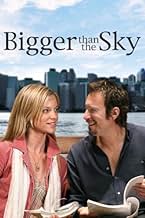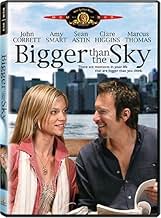While discussing this earnestly contrived comedic melodrama that he scripts and in part produces, Michigan playwright Rodney Vaccaro states that the scenario results from a reaction to the "9-11" occurrences, and that his intention here is to create a romantic detailing of events that will provide a storyline antithetical to the violence that marbles our lives, while including his fondness for community based non-professional theatre as apt background for the narrative. Peter Rucker (Marcus Thomas), a graphic designer with a marked personality deficit, is attempting to reconstitute his life after his girl friend has left him, doing so primarily through reading of self-help books, but is additionally attracted by a community theatre near to his place of employment that is advertising its auditions for Edmond Rostand's Cyrano de Bergerac, and since Peter's freshly imposed solitude has resulted in a surfeit of free time during his evenings, he determines to try out for a small part in the classic play. Although totally lacking stage experience, or even middling innate Thespic ability, the play's director has "seen something" in him and Peter is unaccountably selected, not simply as a member of the cast, but as Cyrano, the lead! Another member of the cast, Mike Degan (John Corbett), a very much experienced player, designates himself as Peter's mentor both during and between rehearsals; however, when Rucker begins to dally with Degan's former lover Grace (Amy Smart), the play's Roxanne, partly due to Mike's urging, the latter begins to resent his protégé, weakening their bond, and this, in addition to unforeseen difficulties in mounting the production, must be rectified before the looming opening night performance. Unfortunately, the film itself has troubles as well, and they are but seldom solved. First-time director Al Corley permits the action to meander, with fifth-billed Thomas, fresh-faced but largely unskilled, a less than engaging Peter Rucker who is, near the film's end, abruptly replaced by first-billed Corbett as linchpin of the story, ratified by his ongoing connections with all of the other principals. Although Peter is found to be completely inadequate as the featured performer, he quaintly is called upon to save the production after a newly appointed Cyrano becomes unavailable, an unconvincing gambit for one who, in reality, is only suitable for tech support or as a supernumerary. In spite of these factors that weaken the piece's credibility it, ostensibly shot in Portland, Oregon, provides a pleasing quality of fellowship evidenced within its small community theatre group, and it treats of many standard stage related elements, both technical and non. The film's most striking sequence is a splendidly realised ending that obviously was in the van of Vaccaro's creative impulses here, its preceding scenes for the most part subsequently crafted. Originally named CAUGHT IN THE ACT, the production had to relinquish that title as it had been allocated elsewhere. Although its box office take was low, a genuine affection for theatre is communicated throughout, and there is some rewarding conceptualization within Vaccaro's often literate screenplay, such as when the play's director, played by Clare Higgins, insists upon eschewing the work's customary emphasis upon Cyrano's proboscis in favour of an examination of his marrow. Even though Corbett is given a misguided rant in one scene against the plays of Shakespeare, he handily wins acting honours. Other meritable turns are to be enjoyed from the perfectly cast Higgins and her countryman Allan Corduner, who is given free rein. Patty Duke enjoys herself in a dual role, and Smart, who as an actress is an attractive young blonde, also enjoys herself. In sum, then, this is a blemished but yet pleasing tribute to all community theatre associations that, in words from Rostand, "work without one thought of gain or fame."































